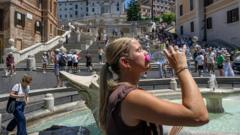As Italy prepares for a referendum to change citizenship laws, many long-term residents like Sonny Olumati feel the weight of exclusion. The proposed reform seeks to halve the citizenship application wait time, but Prime Minister Giorgia Meloni's boycott and a lack of public debate raise concerns about the future of inclusion and equality in Italy.
Citizenship Referendum Sparks Controversy in Italy

Citizenship Referendum Sparks Controversy in Italy
A referendum aiming to reduce the time for foreign residents to gain Italian citizenship has ignited a heated debate within the country, illuminating the struggles of long-term migrants.
Sonny Olumati, a 39-year-old dancer and activist, is an Italian by birth yet lacks citizenship. Despite being raised in Rome, he holds a Nigerian passport, dependent on a residence permit, highlighting the systemic invisibility faced by countless long-term residents. Olumati expresses profound discontent at being treated as an outsider in the country he calls home. This sentiment fuels a campaign for a "Yes" vote in an upcoming national referendum that proposes reducing the waiting period for Italian citizenship from 10 to 5 years—aligning Italy with rest of Europe.
Prime Minister Giorgia Meloni, staunchly opposing the change, characterizes the current citizenship law as effective, urging citizens to ignore the referendum and go to the beach instead. In stark contrast, activists like Olumati are left voiceless, as, deprived of citizenship, they cannot participate in the vote. The referendum seeks to expedite the citizenship process without altering its strict criteria, which includes language proficiency and proof of lawful residency.
Supporters argue that around 1.4 million long-term foreign residents currently in Italy would stand to benefit from the reform—including essential workers in various sectors who contribute significantly to local life. Carla Taibi from the liberal party "More Europe" stresses a need to transform public perception, allowing these residents to be viewed as integral members of Italian society rather than outsiders.
Yet as the debate unfolds, the government’s apparent disinterest raises concerns about a valid turnout threshold for the vote. Political analysts highlight how minimal promotional efforts and Meloni's own abstention from voting could suppress participation, undermining the referendum's potential impact. Critics note that the current government’s narrative surrounding immigration often emphasizes exclusion rather than integration, with personal testimonies adding pressure to sway public sentiment.
Insaf Dimassi, a graduate student also seeking citizenship, echoes the pain of invisibility that comes from being denied full membership in the nation. Reflecting on her experience growing up in Italy, she recounts the frustration of being treated as a non-citizen despite her long residency, illustrating the inadequacies of the citizenship system.
With activists organizing campaigns to educate and encourage voter turnout, the future of the citizenship legislation remains precariously balanced. Regardless of the upcoming vote's outcome, both Olumati and Dimassi emphasize the necessity for continued dialogue on inclusive policies for Italy's diverse population, advocating for a society where voices like theirs are not just heard, but celebrated.






















